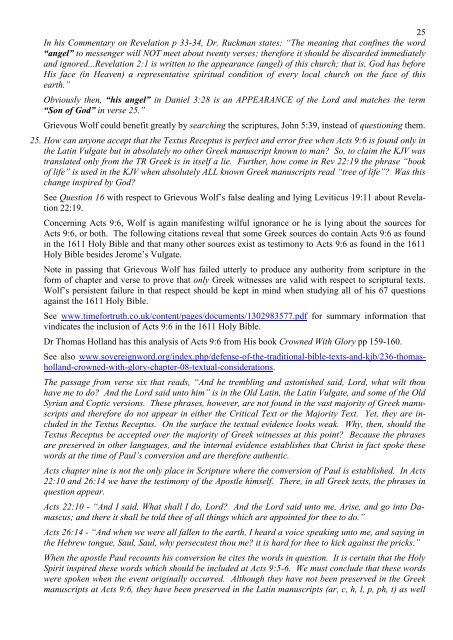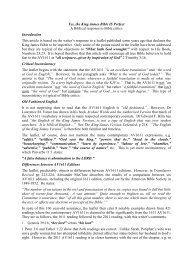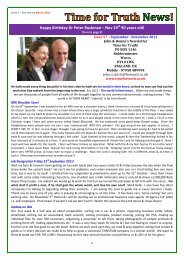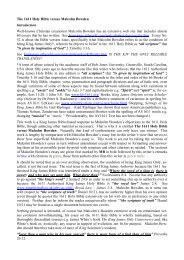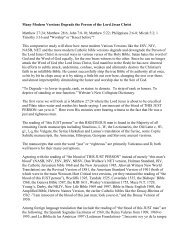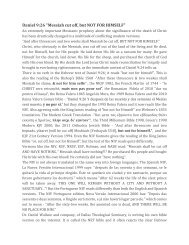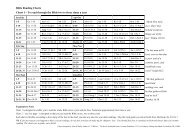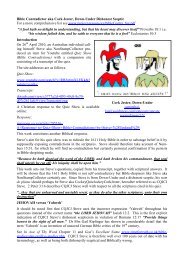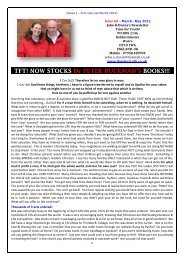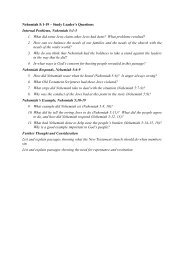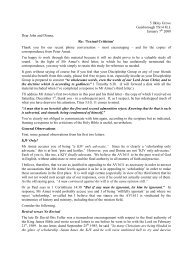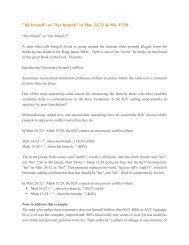A Grievous Wolf - Time for Truth
A Grievous Wolf - Time for Truth
A Grievous Wolf - Time for Truth
Create successful ePaper yourself
Turn your PDF publications into a flip-book with our unique Google optimized e-Paper software.
25<br />
In his Commentary on Revelation p 33-34, Dr. Ruckman states: “The meaning that confines the word<br />
“angel” to messenger will NOT meet about twenty verses; there<strong>for</strong>e it should be discarded immediately<br />
and ignored...Revelation 2:1 is written to the appearance (angel) of this church; that is, God has be<strong>for</strong>e<br />
His face (in Heaven) a representative spiritual condition of every local church on the face of this<br />
earth.”<br />
Obviously then, “his angel” in Daniel 3:28 is an APPEARANCE of the Lord and matches the term<br />
“Son of God” in verse 25.”<br />
<strong>Grievous</strong> <strong>Wolf</strong> could benefit greatly by searching the scriptures, John 5:39, instead of questioning them.<br />
25. How can anyone accept that the Textus Receptus is perfect and error free when Acts 9:6 is found only in<br />
the Latin Vulgate but in absolutely no other Greek manuscript known to man? So, to claim the KJV was<br />
translated only from the TR Greek is in itself a lie. Further, how come in Rev 22:19 the phrase “book<br />
of life” is used in the KJV when absolutely ALL known Greek manuscripts read “tree of life”? Was this<br />
change inspired by God?<br />
See Question 16 with respect to <strong>Grievous</strong> <strong>Wolf</strong>’s false dealing and lying Leviticus 19:11 about Revelation<br />
22:19.<br />
Concerning Acts 9:6, <strong>Wolf</strong> is again manifesting wilful ignorance or he is lying about the sources <strong>for</strong><br />
Acts 9:6, or both. The following citations reveal that some Greek sources do contain Acts 9:6 as found<br />
in the 1611 Holy Bible and that many other sources exist as testimony to Acts 9:6 as found in the 1611<br />
Holy Bible besides Jerome’s Vulgate.<br />
Note in passing that <strong>Grievous</strong> <strong>Wolf</strong> has failed utterly to produce any authority from scripture in the<br />
<strong>for</strong>m of chapter and verse to prove that only Greek witnesses are valid with respect to scriptural texts.<br />
<strong>Wolf</strong>’s persistent failure in that respect should be kept in mind when studying all of his 67 questions<br />
against the 1611 Holy Bible.<br />
See www.time<strong>for</strong>truth.co.uk/content/pages/documents/1302983577.pdf <strong>for</strong> summary in<strong>for</strong>mation that<br />
vindicates the inclusion of Acts 9:6 in the 1611 Holy Bible.<br />
Dr Thomas Holland has this analysis of Acts 9:6 from His book Crowned With Glory pp 159-160.<br />
See also www.sovereignword.org/index.php/defense-of-the-traditional-bible-texts-and-kjb/236-thomasholland-crowned-with-glory-chapter-08-textual-considerations.<br />
The passage from verse six that reads, “And he trembling and astonished said, Lord, what wilt thou<br />
have me to do? And the Lord said unto him” is in the Old Latin, the Latin Vulgate, and some of the Old<br />
Syrian and Coptic versions. These phrases, however, are not found in the vast majority of Greek manuscripts<br />
and there<strong>for</strong>e do not appear in either the Critical Text or the Majority Text. Yet, they are included<br />
in the Textus Receptus. On the surface the textual evidence looks weak. Why, then, should the<br />
Textus Receptus be accepted over the majority of Greek witnesses at this point? Because the phrases<br />
are preserved in other languages, and the internal evidence establishes that Christ in fact spoke these<br />
words at the time of Paul’s conversion and are there<strong>for</strong>e authentic.<br />
Acts chapter nine is not the only place in Scripture where the conversion of Paul is established. In Acts<br />
22:10 and 26:14 we have the testimony of the Apostle himself. There, in all Greek texts, the phrases in<br />
question appear.<br />
Acts 22:10 - “And I said, What shall I do, Lord? And the Lord said unto me, Arise, and go into Damascus;<br />
and there it shall be told thee of all things which are appointed <strong>for</strong> thee to do.”<br />
Acts 26:14 - “And when we were all fallen to the earth, I heard a voice speaking unto me, and saying in<br />
the Hebrew tongue, Saul, Saul, why persecutest thou me? it is hard <strong>for</strong> thee to kick against the pricks.”<br />
When the apostle Paul recounts his conversion he cites the words in question. It is certain that the Holy<br />
Spirit inspired these words which should be included at Acts 9:5-6. We must conclude that these words<br />
were spoken when the event originally occurred. Although they have not been preserved in the Greek<br />
manuscripts at Acts 9:6, they have been preserved in the Latin manuscripts (ar, c, h, l, p, ph, t) as well


